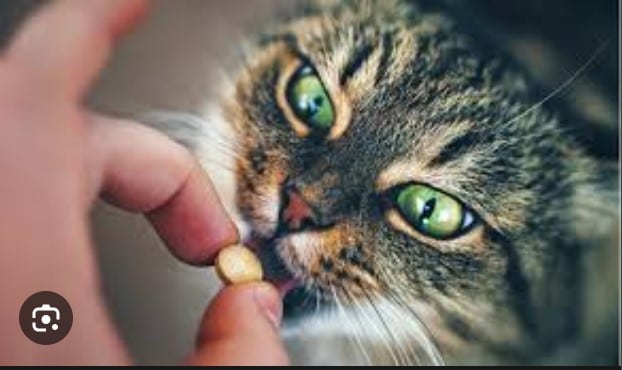Melatonin is a well-known supplement that people often take to help with sleep issues such as trouble falling asleep or adjusting to different time zones (jet lag). It’s also helpful for reducing anxiety. You can easily find it without a prescription in many pharmacies. However, just because it is safe for humans doesn’t necessarily mean you can give it to your cat. That is why in this post, “Melatonin for Cats”, we will find out just how this supplement affects cats. We also discussed What is Melatonin? and Can Cats have it?. As well as it Benefits and Potential Risks associated with Melatonin for cats.
As loving cat owners, we are constantly on the lookout for ways to ensure the well-being and happiness of our feline companions. One emerging trend in veterinary care is the use of melatonin for cats. Melatonin, a hormone produced naturally in the body, has gained popularity for its potential to address various health issues in humans. However, now, it is being explored as a supplement for cats. In this article, we will delve into the uses, benefits, and potential risks associated with administering melatonin to cats.
See also: List Of Cat Safe Flowers
What is Melatonin?
Melatonin is a hormone primarily known for its role in regulating the sleep-wake cycle, also known as the circadian rhythm. This hormone is produced by the pineal gland in response to darkness and is crucial for maintaining a proper sleep pattern. In humans, these supplements are commonly used to address sleep disorders, jet lag, and other related issues.
Similarly, cats also produce melatonin naturally, and its levels rise during periods of darkness. Thus, signaling to their bodies that it is time to rest. However, various factors such as age, stress, and certain medical conditions can disrupt this natural melatonin production in cats. This has led veterinarians and pet owners to explore the potential benefits of melatonin supplementation for feline companions.

Can Cats have Melatonin?
Using melatonin for your furry friend is generally safe, but it’s crucial to follow your vet’s advice and choose recommended products. Only use melatonin products made with good manufacturing practices and confirmed dosages.
Even though some human melatonin products may be okay for them, it’s important to check the ingredients with your vet. Some substances like xylitol, which is harmful to dogs, may not be as safe for cats. It’s better to be cautious.
Consult your vet to ensure that the product is safe for your pet, especially if they are on other medications. Certain medicines, especially those for anxiety, might not mix well with melatonin.
Pregnant or nursing cats and very young kittens should avoid melatonin, so always check with your vet before giving it to them.
See also: List Of Cat Toxic Flowers
Benefits of Melatonin for Cats
Melatonin is mostly known for helping with sleep, and it turns out it can be helpful for cats too, especially when it comes to sleep-related problems. Here are some situations where this supplement might make things better for your cat:
Anxiety and Stress
Cats can get anxious and stressed, especially when they’re in a carrier or at the vet. Giving them melatonin can make these situations less scary. It helps your cat feel calmer, making rides in the carrier or vet visits a bit easier for your furry friend.
Sleep Issues
Just like people, cats can have trouble sleeping for different reasons. This might lead to problems like not being able to sleep or having a weird sleep schedule. Melatonin supplements can be useful in fixing these issues.
By using this supplement, you can help your cat have a more regular and peaceful sleep. This is especially good for cats who seem to have problems with sleep, like being too sleepy during the day or restless at night.

Changes in the Environment
Cats are really good at noticing when things around them change. Moving to a new home, having a new family member, or even just moving furniture can mess up their sleep. Using melatonin during these changes can help your cat get used to the new stuff more easily. It can make the adjustments smoother, so your cat’s sleep doesn’t get all mixed up.
See also: Is Rosemary Safe For Cats? Find out if Rosemary is Poisonous to Cats
Older Cats
As cats get older, their sleep can change because of things like health issues or feeling uncomfortable. Melatonin could be a helpful way to make sure older cats sleep better. It might make their nights more peaceful, contributing to their happiness and comfort during their later years.
Potential Risks Associated with Melatonin for Cats
Using melatonin for cats seems safe, but cat owners need to be careful and talk to a vet before adding any new supplement to their pet’s routine. Here are some things to think about and possible risks connected to melatonin for cats:
Dosage Considerations
It’s really important to figure out the right amount of melatonin for your cat. Cats come in different sizes and types, and each cat might react differently to supplements. Giving the wrong amount could cause problems. It’s a good idea to start with a small amount and change it based on how your cat reacts.
See also: Are Lilies Toxic To Cats: Find Out If Lilies Affects Your Cat
Underlying Health Conditions
Before giving this to your cat, check if there are any other health issues. Cats with existing medical problems or those taking other medicines might react in a different way to melatonin. Talking to a vet makes sure that melatonin is safe and works well with your cat’s overall health.
Potential Side Effects
Even though melatonin is usually okay, some cats might have side effects. This could include a stomachache, feeling tired, or changes in eating. Keep an eye out for any strange behavior or reactions, and you might need to change the amount of melatonin.

Interaction with Medications
Melatonin might not go well with some medicines. Cats taking other medicines, especially those affecting the central nervous system, should be watched closely when melatonin is added. Vet advice is important to avoid any issues or negative effects.
See also: Are Snake Plants Toxic To Cats: See How Snake Plants Can Affect Cats
Side Effects of the Supplement to Cats
When given in the right amount and conditions, melatonin is usually safe for cats, but it’s important to use it carefully. Since it’s a hormone, there’s a chance it might affect other body processes or not work much.
Some things that might happen if your cat takes melatonin are:
- Feeling sleepy
- Losing or gaining weight
- Itching
- Upset stomach
- Confusion
- Changes in fertility
If you notice any of these signs, stop giving melatonin to your cat. Because melatonin is a hormone, it can affect other hormones in the body. That’s why pregnant or young cats who haven’t grown up yet shouldn’t take it. Cats with liver, kidney, or heart problems have a higher risk of having issues, so you should be careful if you decide to give it to them. Always check with your vet first.
See also: Choosing The Right Wood Cat Litter: A Guide To Optimal Pet Care
Melanin Dosage for Cats
Melatonin is usually given to cats by mouth, in the form of a capsule, tablet, or liquid. You can give it to your cat with or without food, and it can be repeated up to three times a day. The effects typically happen quickly, and you should notice an improvement in your cat’s symptoms within an hour or two.
For an average-sized adult cat, a starting dose of around 0.75mg of melatonin, repeated up to three times a day, might be okay, but this is just a rough suggestion.
The right dose depends on various factors like your cat’s age, size, and the specific issue you’re trying to address. Your vet can give you the best advice on the correct dosage.
If you choose a melatonin brand meant for humans, make sure to check the ingredients. It’s essential to ensure the supplement doesn’t have any extra ingredients that might be harmful to your cat. It’s even better to go for a brand specially made for cats.
See also: 10 Most Clever Cat Breeds
How to give your Cat Melatonin
Melatonin supplements that you can buy without a prescription come in different forms like tablets, capsules, chewables, oral solutions, and gummies. Some companies also make special chews or treats for pets.
You can give melatonin to your cat with or without food. Initially, it might help to hide the pills in a cat treat or some canned food. If your cat doesn’t like the taste of a chewable or won’t take a capsule, you might need to put it directly into your cat’s mouth.
There’s also a kind of melatonin implant, like Dermatonin, that goes under the skin. This could be an option for cats that won’t take pills by mouth. It might be a good choice for breeding cats or those with hair growth issues that melatonin can help.
If you’re not familiar with giving injections to your cat, it’s best to talk to your vet before trying this type of melatonin. Your vet can give you guidance or oversee the injection of the implant.
See also: List Of Cat Safe Flowers

Conclusion
Melatonin supplements that you can buy without a prescription come in different forms like tablets, capsules, chewables, oral solutions, and gummies. Some companies also make special chews or treats for pets.
You can give melatonin to your cat with or without food. Initially, it might help to hide the pills in a cat treat or some canned food. If your cat doesn’t like the taste of a chewable or won’t take a capsule, you might need to put it directly into your cat’s mouth.
There’s also a kind of melatonin implant, like Dermatonin, that goes under the skin. This could be an option for cats that won’t take pills by mouth. It might be a good choice for breeding cats or those with hair growth issues that melatonin can help.
If you’re not familiar with giving injections to your cat, it’s best to talk to your vet before trying this type of melatonin. Your vet can give you guidance or oversee the injection of the implant.
See also: https://bondvet.com/b/cat-sedative

